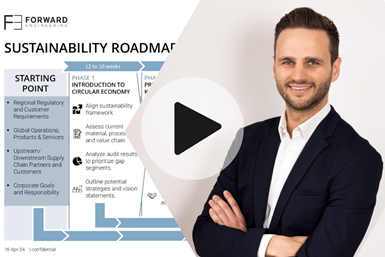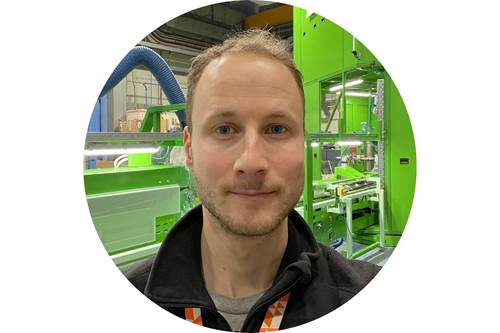CW Tech Days: Sustainability Agenda
Recorded April 17, 2024
Welcome
Speaker: Scott Francis, editor-in-chief, CW
A practical view of sustainability in composites product development (watch for free)
Speaker: Markus Beer, Group Leader Sustainability, Forward Engineering
- Abstract: This presentation will provide an overview of definitions of sustainability and look at the driving forces of social, government and environmental concerns and regulatory efforts. It will then discuss approaches to address those concerns including life cycle analysis of materials and products, as well as designing for sustainability.
Enabling circular use of carbon fibre using fibre alignment technology
Speakers: Lourens Blok, CTO; Gary Owen, CEO, Lineat Composites
- Abstract: Current continuous fibre material formats are expensive, with poor drapability and highly wasteful to use with few recycling options. Lineat has developed a new carbon fibre material is using its patented Aligned Formable Fibre Technology (AFFT) that align chopped fibres. The highly aligned fibre tape can compete with continuous fibre performance, has vastly improved drapability allowing forming complex shapes in single operation, and allows effective re-use of carbon fibre. Lineat’s vision is to create a circular economy for carbon fibre and reduce the heavy cost and environment burden of lightweight composites.
Eco-designing innovative products with recycled carbon fiber
Speaker: Antoine de Turckheim, US Country Manager, Fairmat
- Abstract: Join us as an industry expert from Fairmat shares insights and strategies for incorporating advanced technology and recycled materials into new product development.
Key Topics:
- Overview of Fairmat
- Advanced Recycled Materials
- Tailored tech-driven processes
- Eco-designed parts and products
This is a unique opportunity to discover how recycled carbon fiber can revolutionize your product development process.
Conversion of plant-based feedstocks into acrylonitrile
Speaker: Corey Tyree, CEO, Trillium Renewable Chemicals
- Abstract: Trillium is commercializing a technology to convert plant-based feedstocks into acrylonitrile, a green drop-in replacement for fossil-based acrylonitrile. Today acrylonitrile is the key precursor in the manufacture of carbon fiber, acrylic fiber, ABS plastic, acrylamide, and nitrile rubber which have a diverse range of applications (e.g., autos, aerospace, toys, apparel, sporting goods, wastewater treatment). But changing consumer preferences, regulatory pressure, and new emerging alternatives are driving interest in more sustainable materials. Green drop-in replacement acrylonitrile offers customers a path to sustainable versions of those same products with minimal disruption to their supply chains.
Trillium recently completed a successful pilot plant program that confirmed process performance achieved at small pilot scale. Product from the pilot plant was validated by an independent customer and successfully polymerized into polyacrylonitrile, or the precursor for carbon fiber manufacture. Construction is now underway on a commercial demonstration plant (Project Falcon) that will be located on the US Gulf Coast. Falcon is the final pre-commercial development step and is designed to produce quantities of product to qualify as a supplier to customers. Falcon commissioning is scheduled for the second quarter of 2025 with operations continuing through 2026.
Biomaterials in Sustainable Composites
Speaker: Joe Luttwak, CEO, Lingrove
- Abstract: Biomaterials increasingly serve an essential to the development of truly sustainable composites. Renewable, biomass-sourced, and circular materials provide a crucial alternative to extractive and energy intensive materials that constitute upwards of 25% of the carbon footprint of industry, the built environment and infrastructure. The inclusion and focus on integrating natural, regenerative fiber materials as well as bio-resins decreases reliance on fossil fuels. Furthermore, composites that are constructed around the use of biomaterials maintain improved recyclability and end-of-life disposal solutions, minimizing potential waste. Continued development of innovative biocomposite processing techniques, in application for both natural fiber inputs and bio-based resins, enhance the mechanical properties. Widespread biomaterial adoption within composites bolsters sustainability through every step of supply chain, production, and disposal or reuse. Despite existing challenges surrounding cost and scalability, continuing research and development are crucial to unlocking the full potential of biomaterials within the composite space.
New technologies for bio-based and recyclable thermoset manufacturing
Speaker: Ian Klein, PhD, CTO, Spero Renewables, LLC
- Abstract: As public and corporate interest in bio-based and recyclable composites grow, several companies have initiated the integration of small proportions of bio-based constituents into thermoset formulations and have begun composite recycling via resin pyrolysis. However, new technologies are required to significantly drive increases in bio-content of thermosets and enable recycling of composites. Spero Renewables, LLC stands as a leading Clean Technology company dedicated to enabling renewable and economically viable alternatives to petroleum-derived products. Spero has developed new technologies enabling thermoset resins with up to 80% bio-based content, a significant increase compared to existing offerings in the market. Other technological advances developed by Spero include synthesis of recyclable thermoset resins, enabling composite recycling through multiple lifecycles. Recent chemical insights and applications in materials stemming from Spero’s technologies will be discussed.















